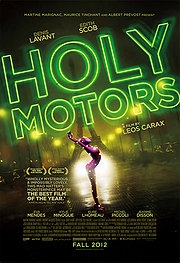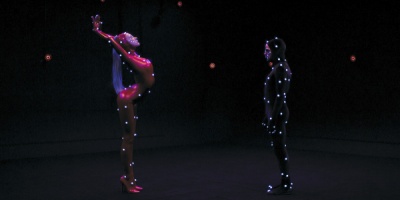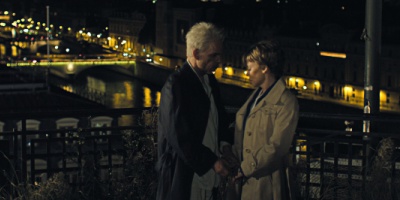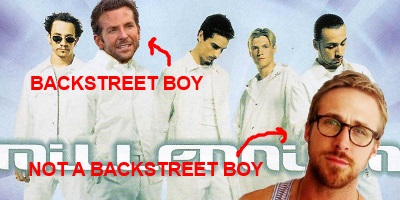Holy Motors

The opening shot of Leos Carax’s Holy Motors is of a cinema audience staring back at you as you sit in your own cinema; as if you’re looking in a mirror. It’s immediately unsettling, and sets out the stall for Holy Motors‘ inherent outlandishness, along with its deconstruction of cinema, acting, and everything in between. Well, we say that, but with this much unexplained lunacy and weirdness on display, parts of Holy Motors could be about anything.
On the face of it, Holy Motors follows Denis Levant’s Monsieur Oscar as he sets out for a day at work. Initially playing the part of a businessman, sat in the back of a handsome white limousine and conducting a stereotypical business conversation over the phone, we come to assume that the various ‘appointments’ that he must meet throughout the day are of the business variety. It’s deliberately misleading, however, as Oscar’s appointments are in fact a series of bizarre real-life performances. Oscar is an actor, however there are no cameras to capture his acts. He steps into numerous different guises, and plays many different roles. It’s unclear who has set his appointments, or whether the people he interacts with are a part of it, or merely innocent bystanders. Or, in some cases, could those he interacts with believe the character he plays to actually exist?
Before each appointment, Oscar transforms himself in his ‘dressing room’ in the back of the limo, becoming a hunchbacked beggar-woman, a motion-capture expert, a dying old man… and Levant’s performance throughout is astonishing. Holy Motors takes great care to show Oscar’s transformations through prosthetics and make-up, but Levant’s transformations run far deeper. Levant doesn’t just put on a costume; he becomes these various misfits, altering his gait; his style of movement; his voice-patterns; his whole aura. It’s a remarkable performance – and a brave one.

As the motion-capture expert, Oscar engages in troublingly graphic pseudo-sex with his contortionist co-star, writhing into each other to the point where you’re not sure whose limbs are whose. Then there’s his frankly terrifying maniac street-hobo, who cavorts through a graveyard, munching on the flowers he finds (as well as hair, money, fingers…), and kidnapping Eva Mendes’ super-model. It’s a violent and unsettling sequence, with the threat of worse to come. And so, when it ends with Levant’s hobo stripping naked (erect penis and all), only to fall asleep, fragile and peaceful, on Mendes’ lap, while she sings a gentle lullaby… Well, like we said. Unsettling.
And it’s not just the weird characters that he excels at; Levant is equally as convincing as the every-man father trying to bring his daughter out of her shell (does the daughter believe Oscar’s character is truly her father, or is she part of the performance?), and as a dying old man, having one beautiful and touching last conversation with his doting niece before passing away… only for him to then rise from his deathbed, have a brief exchange with his fellow actor/niece, and then leave, while she continues to (pretend?!) to mourn. It’s as funny and confusing as it is touching and utterly bonkers, but Levant is brilliant throughout, convincing completely under every different guise.

There are various potential readings as to what Holy Motors is about. It seems to want to stage a deconstruction of the profession of acting itself. Oscar dissolves into these characters so readily, but does he ever have time to craft one of his own? When he’s between appointments, the glimpses we get of Monsieur Oscar – if, indeed, Oscar isn’t just another character – are of a man weary and broken, with an increasing dependency on cigarettes and alcohol. Why would anyone subject themselves to such insanity on a daily basis? And what does it matter when there’s apparently nobody watching? Is the beauty of the act itself enough to justify its worth?
Each of Oscar’s characters can be seen as an archetype of cinema, or a facet of the industry. The wild limp and natty suit of his crazed, mute hobo is surely a homage to the physicality of silent movie stars like Chaplin. Perhaps the only time we see him open up for real, is in his encounter with Kylie Minogue’s fellow “actor”, with whom he was apparently once involved. With the two stealing a mere twenty minutes to be themselves and guardedly catch-up, they mourn the state of their lives, while Kylie breaks into a heartrendingly beautiful song. The moment could easily be taken as a lament for the dwindled genre of musical cinema, as much as for the unhappiness of the pair on screen.

Carax directs with a mad-man’s fervor throughout and the result is something akin to a fever-dream. Throwing any number of insane flourishes into the mix, it nevertheless all flows together seamlessly, and even when you aren’t sure what the hell you’re watching, you’ll enjoy the sensory experience of watching it (for example, the “interval” in the middle of the film, during which Levant parades through an ornate old church, playing an accordion, only to be joined by a full band who walk and play with him, building to an awesome crescendo – a complete non-sequitur, but a captivating one). However, his madness gets the best of him towards the end, and there’s a reveal that is a stretch too far, even for those who have tolerated it thus far. But then, perhaps that was his intent?
Viewing Holy Motors is a bit of a rollercoaster. At once funny and touching, strange and maddening, exhilarating and intensely uncomfortable, it’s like nothing else, and for that we have to praise it. Similarly, Levant’s performance is worthy of all the awards going – if it weren’t in a film so bat-shit mental as to alienate those who dish them out. It certainly won’t be for everyone, but Holy Motors acts as both a nostalgic ode to cinema, whilst simultaneously pushing the boundaries of that very same medium. And that’s got to be worth a look.




Don´t recommend this film to anyone. Pretentious, dull, dark, seemed to last 5 hours